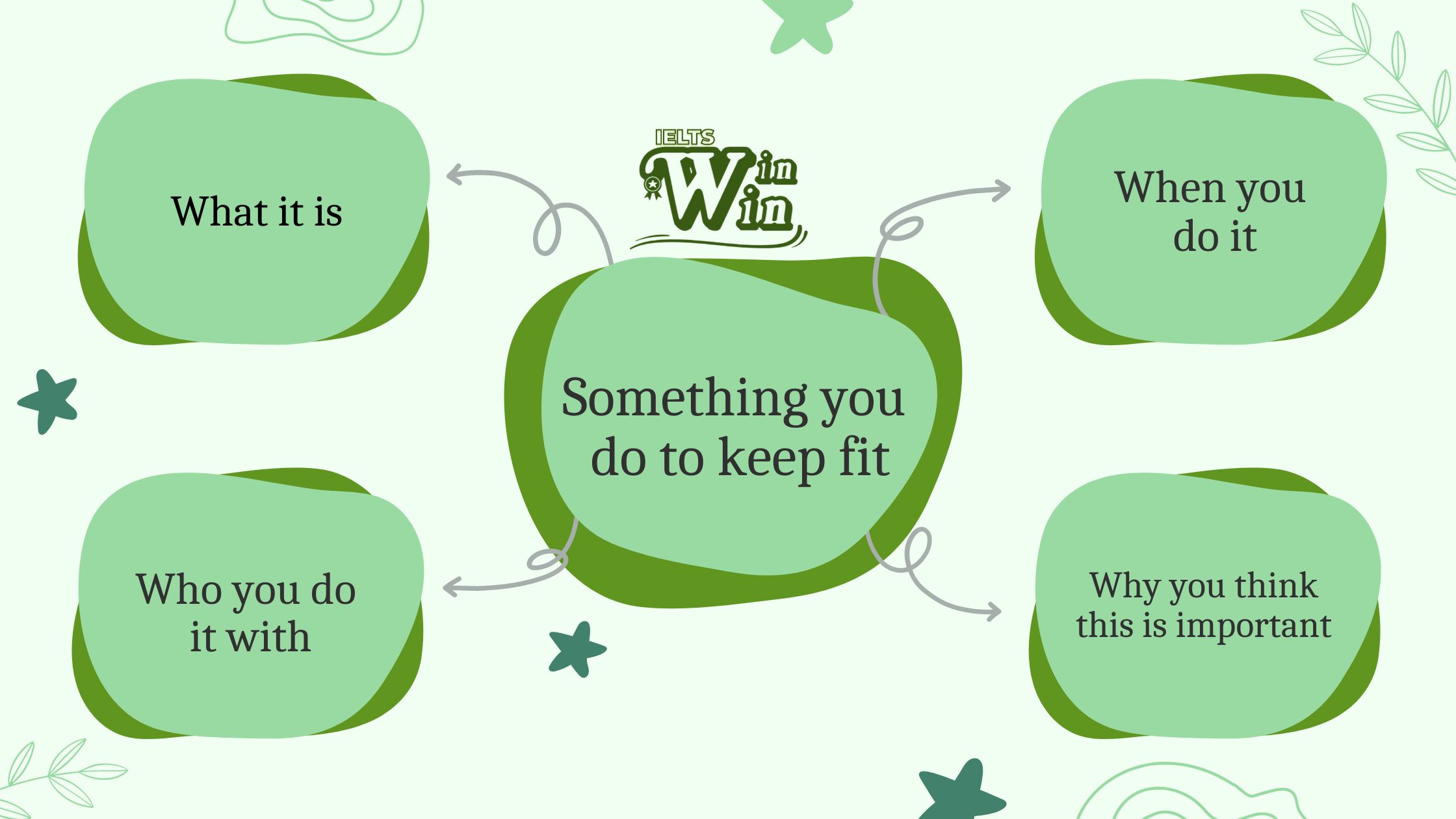✨Part 2: Describe something you do to keep fit and healthy.
You should say:
- what it is
- when you do it
- who you do it with
- and explain why you think this is important
I'm not a sports enthusiast, but I’ve recently adopted the habit of going for a morning run, so I’d like to share my experience with this activity.
As a uni student, I’m often stuck behind my desk working on assignments and exams. Whenever I have some spare time, I usually spend it hanging out with my friends, going to eateries, or binge-watching my favourite shows on Netflix. However, I have noticed how these activities have been adversely affecting my health and mood. After discussing this with my mum, she suggested that I should exercise more, but being a true couch potato, I didn’t want to take up any serious physical activity. My mum recommended that I start with small morning runs, which don't take up much time and are great exercise. Since then, I’ve been running early in the morning every day, and its impact on my health has been amazing. Running hasn’t only improved my cardiovascular health but also my endurance. I also feel happier and more positive, as I believe there are more endorphins being released in my brain. Morning runs are a great solution for me because there is not much traffic, and I get to have some me-time to reassess myself. Sometimes, I even ask my mum to run with me since she needs to stay fit as well.
Running has become an essential part of my daily routine, and I make sure to maintain this practice for at least 30 minutes a day. After every run, I feel so refreshed and start a new day with a happy mind. I highly recommend this activity, it can be done almost anywhere and at any time, so it’s suitable for many people, including myself.
- Enthusiast: /ɪnˈθjuːziæst/ (n) - người đam mê, người nhiệt tình
- Assignments: /əˈsaɪnmənts/ (n) - bài tập, nhiệm vụ được giao
- Eateries: /ˈiːtəriz/ (n) - nhà hàng, quán ăn
- Binge-watching: /bɪndʒ ˈwɒtʃɪŋ/ (v) - xem phim liên tục trong một thời gian dài
- Couch potato: /kaʊtʃ pəˈteɪtəʊ/ (n) - người lười biếng, thường ngồi trên ghế xem TV
- Cardiovascular: /ˌkɑːdiəʊˈvæskjʊlə(r)/ (adj) - liên quan đến tim mạch và mạch máu
- Endurance: /ɪnˈdjʊərəns/ (n) - sức chịu đựng, sức bền
- Endorphins: /ˌendə(ʊ)ˈfɪn/ (n) - hormone giúp giảm đau và tạo cảm giác sảng khoái
- Reassess: /riːəˈses/ (v) - đánh giá lại, xem xét lại
PART 3
✨How can people improve their health?
There are loads of ways to boost your overall well-being, but the simplest one is to adopt a healthy lifestyle. Regular exercise is highly recommended to maintain physical fitness and lower the chances of getting diabetes or other long-term conditions. And, of course, getting enough sleep is crucial for your overall health. Those who are into things like alcohol or smoking should steer clear of them altogether. Lastly, a balanced diet can also contribute to better health by providing the body with sufficient protein and healthy fats.
- Well-being: /ˌwelˈbiːɪŋ/ (n) - sức khỏe tốt, trạng thái tốt
- Diabetes: /ˌdaɪəˈbiːtiːz/ (n) - bệnh tiểu đường
- Crucial: /ˈkruːʃəl/ (adj) - quan trọng, cốt yếu
- Steer clear of: /stɪə klɪər ɒv/ (v) - tránh xa, né tránh
✨Do you think that all diseases are preventable?
Nah, I don't believe that all diseases can be prevented. Sure, living a healthy lifestyle can help prevent many illnesses, but there are some that are caused by factors beyond an individual's control - like genetics or the environment. Plus, even if we understand a disease, there may still be limitations in medical tech or doctors' abilities that prevent us from getting fully cured. The key is to adopt healthy habits and stay on top of regular check-ups to detect any issues early when they're still manageable. That's the best way to prevent a disease from taking hold.
- Diseases: /dɪˈziːzɪz/ (n) - bệnh tật, dịch bệnh
- Limitations: /ˌlɪmɪˈteɪʃənz/ (n) - hạn chế, giới hạn
✨Do you think that in the future there will be fewer diseases?
I'm not optimistic that there will be fewer diseases in the future, especially after COVID-19. Even with ongoing medical research and new treatments being developed, I’m afraid that the threat of pandemics is being underestimated. There's a good chance that we'll see new infectious diseases emerge, just like what happened with the latest pandemic. Factors such as climate change and increased global travel could contribute to this. Additionally, in less developed countries where medical technology is still limited, there's a higher risk of diseases from wildlife spreading and causing outbreaks. So, unfortunately, the risk of diseases is still very real and shouldn't be ignored.
- Optimistic: /ˌɒptɪˈmɪstɪk/ (adj) - lạc quan, tích cực
- Underestimated: /ˌʌndərˈestɪmeɪtɪd/ (adj) - bị đánh giá thấp, bị đánh giá không đúng
- Infectious: /ɪnˈfekʃəs/ (adj) - lây nhiễm, truyền nhiễm
- Pandemic: /pænˈdemɪk/ (n) - đại dịch, dịch bệnh toàn cầu
- Wildlife: /ˈwaɪldlaɪf/ (n) - động vật hoang dã
✨Do you think that medicine should be free?
Wow, that's a really thought-provoking question! But to be honest, I think the answer isn't so straightforward. In countries where the government pays for healthcare, medical treatments and services are usually free or very cheap for patients. This is great as it ensures that people from all social classes have access to medical care, which is an ethical consideration. But the downside is that if the medicine is free, doctors and other healthcare providers might not make as much money, which could make them less motivated to do their job well. So, it's a bit of a tricky question and there might not be one right answer!
- Thought-provoking: /ˈθɔːtprəˌvəʊkɪŋ/ (adj) - đáng suy ngẫm, gợi suy nghĩ
- Straightforward: /ˌstreɪtˈfɔːwəd/ (adj) - dễ hiểu, trực tiếp, thẳng thắn
- Ethical: /ˈeθɪkl/ (adj) - đạo đức, đạo đức học
- Downside: /ˈdaʊnsaɪd/ (n) - khuyết điểm, bất lợi
✨What makes a person a good doctor?
Undoubtedly, a good doctor must have exceptional medical expertise to stay updated with the latest medical research and treatment options, make accurate diagnoses, and create effective treatment plans for their patients. However, being a good doctor also requires strong communication skills, not just for working effectively with colleagues, but also for establishing a relationship of trust by listening to patients' concerns and explaining complex medical concepts in understandable terms for them and their families. Other important factors that contribute to being a good doctor include having compassion, empathy, and a strong commitment to providing the best care possible for their patients.
- Exceptional: /ɪkˈsepʃənəl/ (adj) - đặc biệt, nổi bật
- Expertise: /ˌekspɜːˈtiːz/ (n) - chuyên môn, chuyên gia
- Diagnoses: /daɪəɡˈnəʊsiːz/ (n) - chẩn đoán, sự xác định bệnh
- Compassion: /kəmˈpæʃn/ (n) - lòng trắc ẩn, lòng trắc ứng
- Commitment: /kəˈmɪtmənt/ (n) - cam kết, sự tận tâm.
Xem thêm các bài viết về Speaking Part 2 và 3 ở đây bạn nhé
Đừng ngần ngại để lại thông tin hoặc liên hệ với chúng mình qua địa chỉ sau đây để IELTS WinWin có thể hỗ trợ tốt nhất cho bạn nhé!
Địa chỉ: 118 Nguyễn Xuân Khoát, P. Tân Thành, Q. Tân Phú, TP. Hồ Chí Minh.
Fanpage: IELTS WinWin
Zalo: 0965 439 239 – 085 301 8788
Website: ieltswinwin.com



